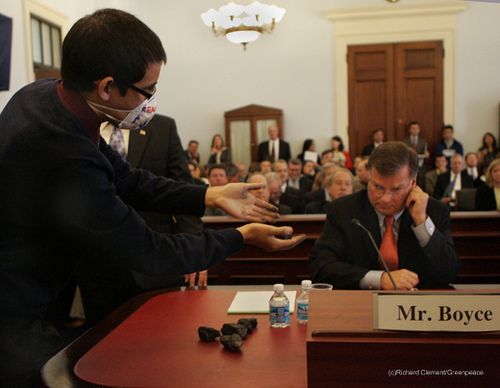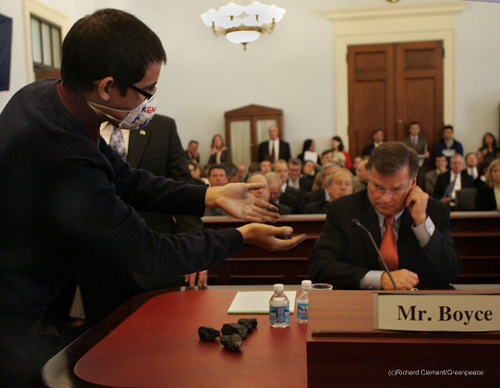Several coal industry executives withstood some heat today during a hearing before the House Select Committee on Energy Independence and Global Warming. “The Role of Coal in a New Energy Age” hearing featured a slate of four speakers who attempted to defend their industries — with one denying anthropogenic global warming -as part of the clean energy future of the U.S.:
- Gregory Boyce, President and CEO, Peabody Energy Corporation
- Steven F. Leer, Chairman and CEO, Arch Coal, Inc.
- Preston Chiaro, Chief Executive for Energy and Minerals, Rio Tinto
- Michael Carey, President, Ohio Coal Association
We had some folks tweeting from inside the hearing, and here are two choice quotes from the testimony of the coal industry representatives:
“All that we’re asking is that the (Environmental Protection Agency) step back and reconsider its endangerment finding… There needs to be another independent review of the data to put to rest all of those issues.” – Gregory Boyce
“The role for coal in the new energy age is greatly hampered by the regulatory assault waged by the Obama Administration and in particular, the Environmental Protection Agency.” – Michael Carey
There was extensive “rah-rah-ing” for carbon capture and sequestration (CCS) technology during the hearing, but even Michael Carey of the Ohio Coal Association admitted that “CCS is 15-20 years away from commercial deployment.”
 Activists brought the hearing to a halt proclaiming “coal is dirty!”Photo: Flickr via Greenpeace, with permissionThe testimony was briefly interrupted at the start by several youth activists who walked to the speakers’ table wearing facemasks, dumped lumps of coal on the table, and then displayed their blackened hands while another activist in the back of the room yelled, “COAL IS DIRTY!” until security escorted them from the room.
Activists brought the hearing to a halt proclaiming “coal is dirty!”Photo: Flickr via Greenpeace, with permissionThe testimony was briefly interrupted at the start by several youth activists who walked to the speakers’ table wearing facemasks, dumped lumps of coal on the table, and then displayed their blackened hands while another activist in the back of the room yelled, “COAL IS DIRTY!” until security escorted them from the room.
Once testimony started again, the Peabody, Arch and the Ohio Coal Association reps made it clear that any U.S. move to cut its carbon pollution would have little effect on global warming. The three all talked about the need to reduce emissions and how they are working on reductions emissions via CCS. But they were also clear in their position that they should not have to cut emissions until CCS is ready. Committee member Rep. Jay Inslee had a great answer to that: “That’s like saying when people stop robbing banks, then we will put a law in place to make robbing banks illegal. That doesn’t make any sense.”
Beyond that, the three also demonstrated that they continue to push for new coal plants despite the threat of global warming. The three also took swipes at the Clean Air Act’s authority over greenhouse gases, as it’s no surprise the coal industry would love to block EPA’s ability to protect the public’s health and safety by enforcing limits on global warming pollution under the Clean Air Act – limits reaffirmed by the Supreme Court almost three years ago
Thankfully, at least Rio Tinto’s Preston Chiaro had some positive statements on global warming and clean energy. The company is part of USCAP, and Chiaro said the company wants cap-and-trade in order to bring more stability to its business: “We will either shape policy, or we will have policy thrust upon us.”
Rio Tinto also at least believes that humans are causing global warming, unlike Carey of the Ohio Coal Association, who used part of his testimony to rip the science and refer to the anti-global warming Petition Project (which has been debunked, by the way).
The hearing’s website stated the intent well:
For the first time in recent memory, the CEOs of America’s top two coal mining companies, and a leading international company, will come to Capitol Hill to answer questions on their positions on climate change, clean energy policy, and the challenges that currently face their industry.
“Just as our national energy policy is at a crossroads, so, too, is the coal industry,” said (Committee Chair) Rep. Edward J. Markey. “Whether it’s climate science, the viability of ‘clean coal,’ or safety concerns, I believe Congress requires answers from the coal industry on their ability to be a part of our clean energy future.”
Reps. Markey and Inslee did a phenomenal job taking the coal industry to task for their global warming doubts and for the industry’s accusations that the government is assaulting them via regulation – when Congress has in fact been including billions for CCS in its recent energy and climate bills.
“If there is a ‘war’ being waged here, it’s being waged by your industry against our grandchildren,” said Inslee at one point. “Is it fair for the coal industry to be able to put CO2 in the atmosphere at zero cost?”
So while the speakers attacked all they could – the Clean Air Act, the Clean Water Act, the Environmental Protection Agency, and even the reality of global warming itself – Reps. Markey, Jay Inslee and others held their feet to the fire.
It is clear that the coal industry continues to wear blinders while living in the past. Coal is not a part of our clean energy future.



